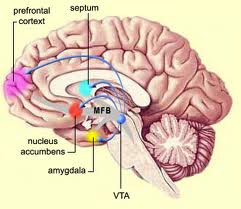Strange Psychological Facts – Part Two

Welcome to ‘Strange Psychological Facts – Part Two.’
Did you read the first ‘Strange Psychological Facts’ ? You will recall that four strange facts about human behavior were explained:
1) You can remember 3 or 4 things at a time.
2) You cannot multi-task.
3) You cannot resist noticing food, sex or danger.
4) You have selective attention (like the chimp on the right in the photo).
Since most of us are constantly seeking knowledge – we just can’t help it – here are three more strange psychological facts to ponder.
Dopamine Pathways

5) Your Dopamine Causes ‘Seeking’ Behavior.
I know. You may have heard the myth that dopamine controls the pleasure system of your brain. That it makes you feel pleasure and motivates you to seek out specific rewards such as sex, food and drugs.
But the truth is dopamine does much more than that. The latest research tells us that dopamine causes seeking behavior – whether it is sex, food, drugs or information. True!
Here’s a brief explanation. For humans to survive, we much perform certain vital functions including eating, responding to aggression, and reproducing. Certain areas in our brains provide a pleasurable sensation as a reward for performing these functions.
Together, these areas form what is known as the ‘reward circuit.’ For those who require specifics, a group of neurons at the center of our brain known as the ventral tegmental area or VTA are like a central switchboard receiving information from other areas. The VTA forwards this information to another structure in our brain, the nucleus accumbens .
How is this accomplished you may ask? Aha! The VTA uses a chemical messenger – dopamine! As the level of dopamine increases, it reinforces our behaviors.
Scientists at the National Heart Institute of Sweden have been studying the effects of dopamine since 1958, and have determined that it is critical in thinking, moving, sleeping, mood, attention, motivation, and reward.
But here is the latest research which slightly alters this view. Dopamine does not cause us to experience pleasure. It causes seeking behavior. It makes us want, desire, seek out and search. It keeps us motivated to learn and survive. Not just because of our physical needs like food or sex, but curiosity about ideas and information.
It is the opoid system that makes us feel pleasure. The two systems, dopamine (wanting) and opoid (liking) are complementary. The first (wanting) moves us to action and the second (liking) makes us feel satisfied enough to pause temporarily. If the seeking isn’t turned off at least for a short time, we would be running on a never-ending treadmill.
The good news is that this latest research indicates that the dopamine system is stronger than the opoid system. We seek more than we are satisfied, so seeking is more likely to keep us alive than sitting around in a satisfied stupor (like certain unnamed members of the U.S. Congress).
With my supernatural power of ESP, I know you are thinking ‘what has dopamine got to do with seeking information?’

Well, let me ask you a question. Have you ever felt addicted to email or texting or Twitter? Can you ignore your email if you notice there are messages in your inbox? Have you ever used Google to search for information . . . and a half hour later you are still reading and searching? Perhaps for a different subject than before? These examples reflect your dopamine system at work.
Because of the Internet, Twitter and texting, we can have almost instant gratification of our desire to seek. Want to talk to someone right now? Send a text and they may respond in just a few seconds. Want to look up some information? Just type it into Google. Want to see what your friends are up to? Go to Twitter or Facebook.
Our dopamine starts us seeking and then we get rewarded which makes us seek more. It becomes harder and harder to stop looking at our email, stop texting, stop checking our cell phones for new messages or text.
Brain scan research shows that our brains show more stimulation and activity when we ANTICIPATE a reward than when we actually GET it. Extensive research on rats shows that if you destroy dopamine neurons, rats can still walk, chew, and swallow. But they will starve to death even when food is nearby. They have lost the desire to go get the food. (Hmmmmmm! Doesn't this look like an earthshaking opportunity for diet drug manufacturers?)

Dopamine is also stimulated by UNPREDICTABILITY. Think about your electronic gadgets and cell phones. Our emails, tweets and texts show up, but we don’t know exactly when they will or whom they will be from. It’s unpredictable. This is exactly what stimulates the dopamine system.
You may remember from your Psychology 101 class that this same unpredictability stimulates gamblers to gamble. Slot machines employ the same system as the variable reinforcement schedule. You do not know if or when you will be rewarded. Dopamine is involved in variable reinforcement schedules. If you hear the sound of a text or email or see a visual clue, it enhances the addictive effect. Remember Pavlov and his doggie.
Oh, oh. Have to stop now. I just received a tweet and the message is so short (less than 140 characters) it does not fully satisfy me. My dopamine system is very upset.
Laughing Panda

6) – You CAN Change a Habit.
Do you have a habit you would like to change? Are you trying to change the habits/behavior of other people? If you read any of the research on habits, you will find that habits are difficult to change.
Have you seen the amusing video about the musical stairs? If you have, please watch it again before reading on. There are three important lessons about changing habits illustrated in the video.
How to Change a Habit
It usually takes a lot of hard work to change a habit so here are three ideas to assist you in this task:
1 - Make the process FUN. If you want to change a habit you must substitute a new habit for the old one. To make the new habit more enticing, it must be a lot more FUN than the old one. A lot more.
2 - Make the new habit a SURPRISE. We enjoy surprises if they are pleasant or fun. Surprises capture our interest and attention. And you already know about the research indicating that things that are unpredictable stimulate our dopamine system that anticipates rewards.
When you pleasantly surprise people, you get their attention and they become primed to believe that what comes next might be pleasurable.
3 - Use a CROWD. Recent research in the area of social validation shows that people are greatly influenced by the behavior of others. When we see a number of other people doing something that looks interesting, like children, we will tend to join in.
The musical stairs in the video have all three elements. Stairs that look just like a piano and make real piano sounds when you use them are great fun. They are also a surprise since you want to prove to yourself that you can make those musical sounds, too. Add to that, almost everyone else you see is using the stairs – social validation at work.
Next time you choose a new habit to replace an old one, figure out how you can include fun and surprise. If you can find a way to include a crowd, too, you will be way ahead of the game.
7) Your Laughter IS the Best Medicine.
People, no matter who they are, no matter where they are, have the ability to laugh because we are basically social animals. Laughter is unconscious. You don’t believe me? Go ahead, try to laugh right now. What happened? You can’t produce genuine laughter on command. When you try to, it sounds fake and forced.
Did you know some animals can laugh? Here is the evidence:
Cookie the Laughing Penguin
The Marx Brothers
Since laughter is universal and we laugh relatively often, you might think there have been tons of research on the subject. But actually very little laughter research has taken place. Except for Norman Cousins. You may remember Norman. He suffered from a painful connective tissue disease (ankylosing spondylitis) and the prognosis for his recovery was poor.
But Norman believed he could cure himself using humor as a painkiller and substitute for chemical therapy. He watched old Marx Brothers movies which evoked genuine belly laughter. As a result he was able to sleep at least two hours at a time free of pain without taking any medication.



Did you know there is now a scientific name for the study of humor as a treatment? It’s called psychoneuroimmunology. And there is now a title for the practice of humor therapy – Mirthologist.
Some of the available research on laughter has shown that laughing may aid in:
- lowering blood pressure
- reducing stress hormones
- increasing muscle flexibility
- boosting immune function by raising levels of infection-fighting T-cells, disease-fighting proteins, and B-cells which produce disease-destroying antibodies.
- triggering the release of endorphins, the body’s natural painkillers
- producing a general sense of well-being.
Since I see myself as an amateur Mirthologist, here is some additional research on laughter I discovered:
- Laughter is universal and cross-cultural. All humans in all cultures laugh.
- Laughter is for social communication. We laugh 30 times more often when we are with others.
- Laughter is contagious. We will smile and then start laughing as we hear others laugh.
- Laughter appears early in babies at about 4 months old.
- We rarely laugh in the middle of a sentence. We usually laugh at the end.
- Other primates and mammals laugh. There are videos of rats laughing while being tickled.
- Most laughing occurs by the person who is speaking, not the person who is listening. The person who is speaking laughs twice as much.
- Women laugh more than twice as much as men.
- Laughter denotes social status. The higher up on the hierarchy you are in a group, the less you will laugh.
There are many reasons to laugh – to cope with a stressful situation, to break the ice at a tense moment, or to make someone feel more comfortable. We know how important it is to eat healthy, exercise our bodies and our minds and reduce the stressors in our lives, but let's not forget how important it is to laugh. "Laughter IS the Best Medicine."
Note: I have used that line at the end of my profile for several years now.
Now, as a self-proclaimed Mirthologist, I would be remiss if I did not leave you laughing. Watch Tucker, a Schnoodle (half Schnauzer, half Poodle) who plays the piano and sings his own accompaniment several times each day.
© Copyright BJ Rakow, Ph.D. 2012, 2014. All rights reserved. Author, "Much of What You Know about Job Search Just Ain't So." Includes valuable information for older workers, and how to negotiate salary successfully.
Personality Tests
- Take the PIG Personality Test
Would you like to know more about your personality? Without taking any test? All you have to do is draw a ... - Simple Symbol Personality Test
Now that you have examined your personality by taking (a) the Pig Personality Test, (b) the Celebrity Personality Test, and (c) the One-Question Personality Test, it’s time to take a look at the Simple Symbol Personality Test.






